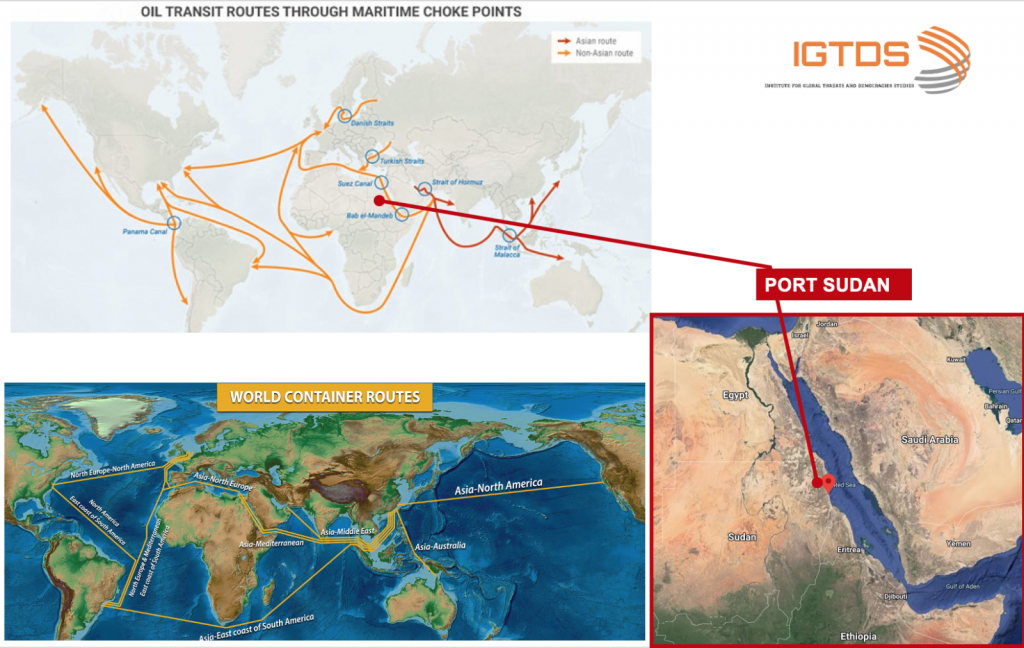Sudan has approved the deployment of Russian naval logistics base on its territory by pledging to develop and modernize the country’s infrastructure in order to maintain and supply Russian warships, and provide hospitality services for the crew members.
The military base idea has been on the table since 2012. According to the German’s MFA report, Russia tries its mil buildup in six African countries: Central African Republic, Egypt, Eritrea, Madagascar and, besides Sudan, Mozambique.
Sudanese Ex-President Al-Bashir visited Russia in 2017 to discuss this issue. Despite a 2019 coup overthrowing al-Bashir’s rule, the talks continued with Lt. Gen. Abdel Fattah Abdelrahman al-Burhan, de facto the head of the country. Thus, Russia established communication channels and corrupted Sudan’s military branch. Possibly, Sudanese top-military command may be recruited by Russian intel during military involvement in suppression of opposition by al-Bashir government in 2015-2018.
The situation in Sudan reminds Syria where the government faced with domestic disturbances threatening to spiral out of control sought and accepted Russian domestic and military support that seems to have evolved into Russian mercenary “boots on the ground.”
Moscow is Sudan’s first supporter in armaments against the background of the latter’s strained relations with the United States. The political and military relations of the two countries have witnessed a remarkable development most of the time, especially after Sudan’s independence in 1956.
Since 1970s Moscow seek to dominate in the Persian Gulf and the Red Sea area.
November, 10 Moscow revealed a draft agreement with Khartoum allowing deployment a naval logistics base on the Sudanese coast in the Red Sea.
According to the agreement the mentioned naval base will be able to accommodate up to 300 soldiers and employees in addition to ships equipped with nuclear gear “taking into account nuclear and environmental safety requirements”, provided that no more than four ships would anchor simultaneously.
However, a group of four Russian warships armed with Caliber cruise missiles will be able to threat the U.S. Diego Garcia military base, the American strategic bombers B-1B Lancer location. The base in Port Sudan will open the Indian Ocean marine theatre for the Kremlin.
Russia expressed willingness to deliver weapons and military equipment to Sudan for free in order to maintain air defense systems to the proposed facility. Currently, the Sudanese Army is said to be 60% equipped with Russian, or Soviet, military hardware. Sudan is Russia’s third biggest arms importer in Africa.
The naval logistics center in Sudan will be Russia’s first military base in Africa since the fall of the Soviet Union. During that time, the country had a permanent naval base in Somalia.
However, the example of such Russian logistic base in Tartus, Syria gives the understanding of how it can be used for the situational deployment of a significant number of forces in the region in case of emergency and to set striking force for locking the specific region, the Red Sea in this case with a help of A2/AD zone.

Such a scenario is likely to happen taking into account the level of the Kremlin’s relations with Egypt and Ethiopia (weakened by crisis in Tigray), which will not impede passage of the Russian military ships.
There is a possibility of creating a tripartite alliance of Sudan, Russia, and Iran where Moscow is expected to work for the resumption of relations between Khartoum and Tehran. Undoubtedly, formation of such coalition will sacrifice Sudan’s relations with the Gulf countries, especially the Qatar-siege countries: Saudi Arabia and the UAE.
A few years ago Russia started looking for the ways to deploy a permanent base in Djibouti that already hosts Chinese and American naval bases. However, the negotiations failed. After that Russia turned to Sudan by seeking a naval base on the country’s Red Sea coast.
The Kremlin will embark on such an expensive adventure, as it will once again demonstrate the potential for confrontation with the US and its significant presence in the region, and gain the support of the countries seeking to weaken the US influence or bargain with it. In addition, it will allow establishing control over oil supply routes in the Red Sea, and in coordination with Iran, if necessary, blocking the oil export from the Arabian Peninsula, exerting a strong influence on the dynamics of world oil prices and blocking oil export by D2/AD zone in the Red Sea.
In case of the deployment of a naval base in Sudan, Russia may face increasing competition with China which is significantly interested in this country, as well as a conflict of interest with Saudi Arabia, for which the Russian Navy in Port Sudan poses both risk for the oil industry and the national security in the context of logistics for military supplies to the Houthi rebels in Yemen. The Russian Navy in Sudan will also significantly weaken the weight of Ethiopia as one of the regional centers of influence. This is likely to affect the overall political effect cost of Russia’s presence in the region.
Eritrea is also expecting to make the same agreement to build a logistics base for the Russia navy on its coast that is located closer to Yemen and the Horn of Africa.



